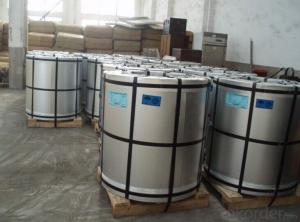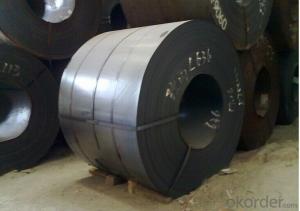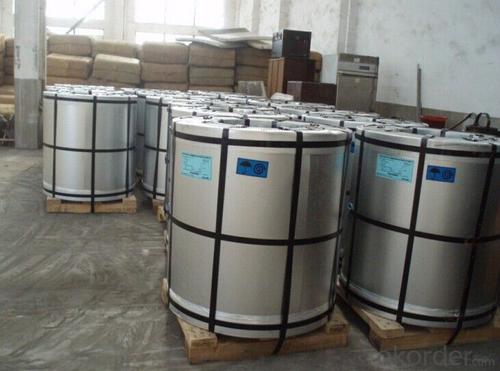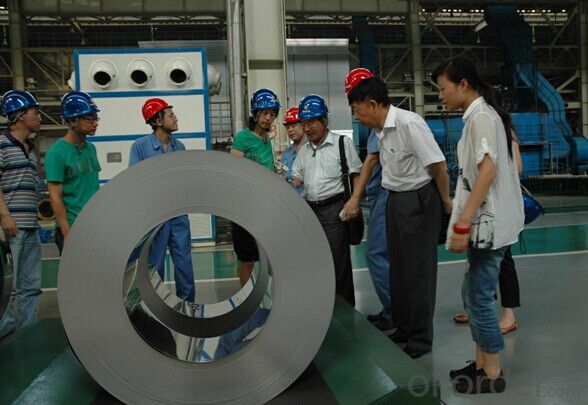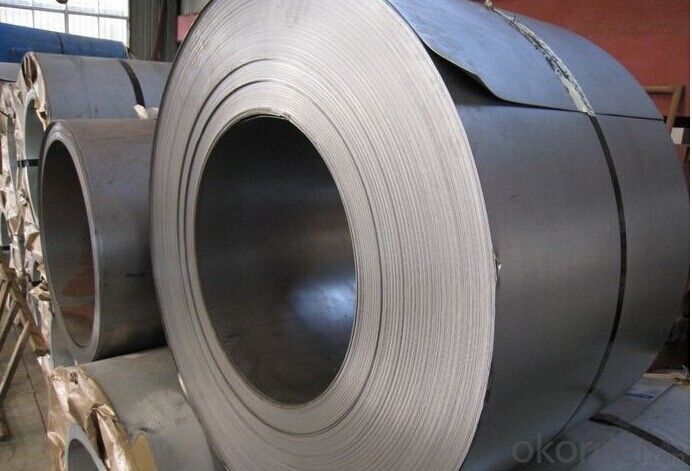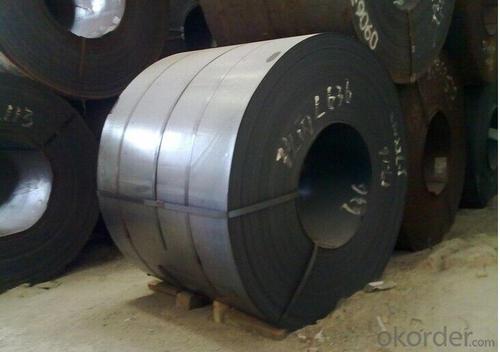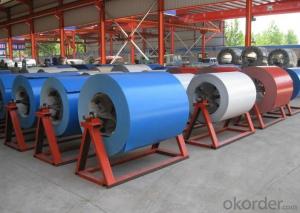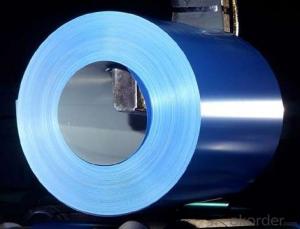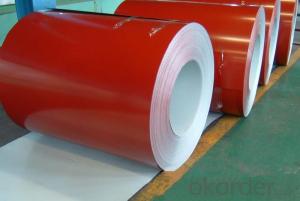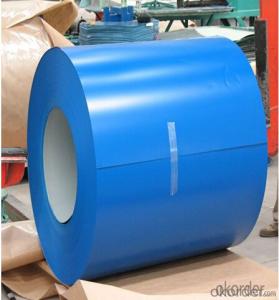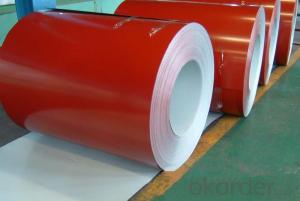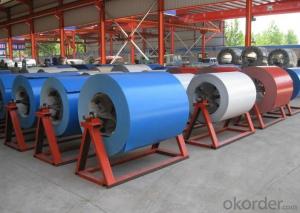Pre-painted Galvanized/Aluzinc Steel Sheet Coil with Prime Quality and Lowest Price BLUE
- Loading Port:
- Shanghai
- Payment Terms:
- TT OR LC
- Min Order Qty:
- 222 m.t.
- Supply Capability:
- 111111 m.t./month
OKorder Service Pledge
OKorder Financial Service
You Might Also Like
1.Structure of Pre-painted Galvanized/Aluzinc Steel Coil Description
With GI (aluzinc) as base metal, after pretreatment (degrease and chemical treatment) and liquid dope with several layers of color, then after firing and cooling, finally the plate steel is called pre-painted galvanized (aluzinc) steel. Pre-painted galvanized steel is good capable of decoration, molding, corrosion resistance. It generally displays workability, durability and weather resistance.
2.Main Features of the Pre-painted Galvanized/Aluzinc Steel Coil
• Excellent corrosion resistance
• Excellent weather resistance
• Capability of decoration, molding, corrosion resistance
• Workability, durability
• Excellent heat resistance performance
• High strength
• Good formability
• Good visual effect
3.Pre-painted Galvanized/Aluzinc Steel Coil Images
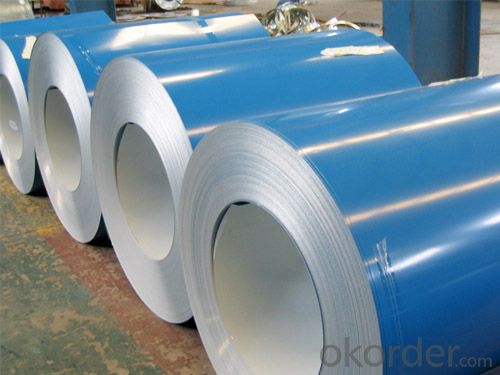
4.Pre-painted Galvanized/Aluzinc Steel Coil Specification
Quality standar: JIS G3312 CGCC & CGLCC
Hardness of P: Both soft and hard quality are available
Surface finish: with or without protect film
Thickness : 0.14-1.20 mm
Width : 914mm, 1000mm, 1220mm and 1250mm, thickness 600-1250mm is available
Finish by coil or sheet: Both sheet and coil are available
8Zinc coating: 60-275G/M2, both sides
Paint thickness for top side : 5 micron primer + (10-20) microns modified polyester, any RAL color code.
Paint thickness for back side: (5-10) microns Epoxy
Weight per coil: 4-6 tons, also can be upon customer's requirements
Max loading weight in one 20ft container : 25 tons generally
5. FAQ of Pre-painted Galvanized/Aluzinc Steel Coil
We have organized several common questions for our clients,may help you sincerely:
1. What is the minimum order quantity ?
Our MOQ is 50mt for each size. And we will consider to give more discount if you make big order like 1000 tons and more. Further more, the more appropriate payment term your offer the better price we can provide.
2. How long can we receive the product after purchase?
Usually within thirty working days after receiving buyer’s advance payment or LC. We will arrange the factory manufacturing as soon as possible. The cargo readiness usually takes 15-25 days, but the shipment will depend on the vessel situation.
3. How to guarantee the quality of the products?
We have established the international advanced quality management system,every link from raw material to final product we have strict quality test;We resolutely put an end to unqualified products flowing into the market. At the same time, we will provide necessary follow-up service assurance.
- Q: What are the different coil cutting methods used for steel coils?
- There are several different coil cutting methods used for steel coils, including slitting, shearing, and laser cutting. Slitting involves using circular blades to cut the coil into narrower strips. Shearing involves using straight blades to cut the coil into desired lengths or shapes. Laser cutting, on the other hand, uses a high-powered laser beam to precisely cut the steel coil into specific shapes or patterns. Each method offers its own advantages and is chosen based on the desired outcome and requirements of the steel coil cutting process.
- Q: What is the average tensile strength of a steel coil?
- The average tensile strength of a steel coil can vary depending on the specific grade and type of steel used. However, on average, steel coils typically have a tensile strength ranging from 300 to 2,500 megapascals (MPa).
- Q: What are the different types of coil leveling machines?
- There are three main types of coil leveling machines: precision levelers, corrective levelers, and stretcher levelers.
- Q: Suppose you made a sword out of diamond (just follow me here, it's only theoretical). Would it be lighter than a sword of the same size made out of steel?
- steel is heavier. 6.5 mm/1 carat of steel is 7 grams, while diamond is 1/5 a gram
- Q: I am making a sword of 1060 carbon steel and would like to know how to heat treat it once it's ready, could anyone help please?
- I've okorder for back and forth communication. I could type up some lengthy post, you'd read it and be like I don't have that piece of gear and all my time is wasted.
- Q: What are the different methods of perforating steel coils?
- There are several methods of perforating steel coils, including rotary punch, laser cutting, and stamping. Each method offers its own advantages and is chosen based on factors such as the desired hole size, material thickness, and production volume. Rotary punch involves using a rotating tool to create holes in the steel coil, while laser cutting uses a high-powered laser beam. Stamping, on the other hand, involves using a die and press to create holes by applying pressure to the steel coil.
- Q: Well im currently doing a project. Wanna help me? Because trust me, i really need it. You know how steel was created in China? If you didnt, you just learned something newww(: but anyways got any info on that? Websites? or just info from websites? Well lemme know because if its the best you get Best Answer Easy points right? (: Okay thanksss (:
- Steel is created in a primitive way whenever iron oxide ore (red dirt) is mixed with wood and burned. Seemingly everyone has a pet theory how their own selected country was the first to notice and do it on purpose. Regards, Larry.
- Q: How are steel coils processed before they are used in manufacturing?
- Before being used in manufacturing, steel coils undergo several processing steps. The initial step, known as pickling, entails immersing the coils in an acid bath to eliminate any surface impurities such as rust or scale. This step serves to enhance the surface quality of the steel. After pickling, the coils are subjected to a process called cold rolling. This involves passing the coils through a set of rollers to decrease their thickness and enhance their dimensional accuracy. Additionally, cold rolling enhances the mechanical properties of the steel, rendering it stronger and more durable. Following cold rolling, the coils are annealed. This process involves heating the coils to a specific temperature and gradually cooling them. Annealing helps to alleviate internal stresses within the steel and improve its formability and ductility. Subsequently, the coils may undergo further surface treatments, such as galvanizing or coating. Galvanizing involves applying a layer of zinc to protect the steel from corrosion, while coating may involve applying various types of paint or polymer to enhance the steel's appearance or provide specific functionalities. Once the coils have undergone the necessary processing and treatments, they are typically cut into smaller sheets or strips according to the manufacturing requirements. These sheets or strips can then be utilized in various manufacturing processes, including stamping, forming, welding, or fabrication, to create a diverse array of products, ranging from automotive components to appliances, construction materials, and more. In summary, steel coils go through a series of processing steps, including pickling, cold rolling, annealing, and surface treatments, before they are prepared for use in manufacturing. These processes result in improved quality, strength, and formability of the steel, enabling it to be transformed into a wide range of products.
- Q: How are steel coils used in the production of metal shelving?
- Steel coils are used in the production of metal shelving by being processed and formed into the desired shape and size. The coils are unwound and then either cut or shaped using various techniques such as bending, welding, and punching. This allows for the creation of sturdy and durable shelves that can hold heavy loads.
- Q: Cold rolled steel coil steel, what is the difference?
- Steel rolling process is different from the steel produced naturally different!
Send your message to us
Pre-painted Galvanized/Aluzinc Steel Sheet Coil with Prime Quality and Lowest Price BLUE
- Loading Port:
- Shanghai
- Payment Terms:
- TT OR LC
- Min Order Qty:
- 222 m.t.
- Supply Capability:
- 111111 m.t./month
OKorder Service Pledge
OKorder Financial Service
Similar products
Hot products
Hot Searches
Related keywords
